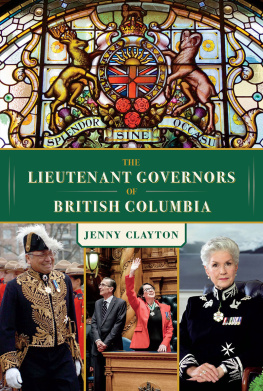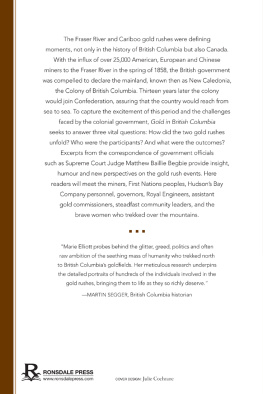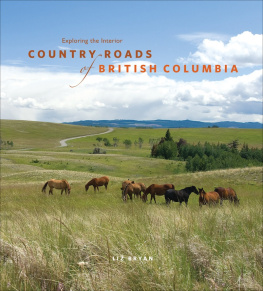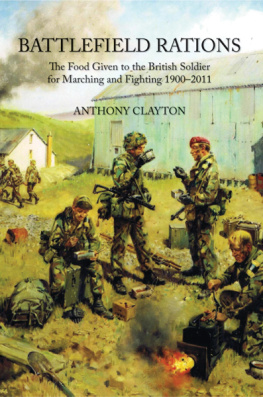Clayton Jenny - The Lieutenant Governors of British Columbia
Here you can read online Clayton Jenny - The Lieutenant Governors of British Columbia full text of the book (entire story) in english for free. Download pdf and epub, get meaning, cover and reviews about this ebook. year: 2019, publisher: Lightning Source Inc. (Tier 3), genre: Politics. Description of the work, (preface) as well as reviews are available. Best literature library LitArk.com created for fans of good reading and offers a wide selection of genres:
Romance novel
Science fiction
Adventure
Detective
Science
History
Home and family
Prose
Art
Politics
Computer
Non-fiction
Religion
Business
Children
Humor
Choose a favorite category and find really read worthwhile books. Enjoy immersion in the world of imagination, feel the emotions of the characters or learn something new for yourself, make an fascinating discovery.
- Book:The Lieutenant Governors of British Columbia
- Author:
- Publisher:Lightning Source Inc. (Tier 3)
- Genre:
- Year:2019
- Rating:4 / 5
- Favourites:Add to favourites
- Your mark:
- 80
- 1
- 2
- 3
- 4
- 5
The Lieutenant Governors of British Columbia: summary, description and annotation
We offer to read an annotation, description, summary or preface (depends on what the author of the book "The Lieutenant Governors of British Columbia" wrote himself). If you haven't found the necessary information about the book — write in the comments, we will try to find it.
The Lieutenant Governors of British Columbia — read online for free the complete book (whole text) full work
Below is the text of the book, divided by pages. System saving the place of the last page read, allows you to conveniently read the book "The Lieutenant Governors of British Columbia" online for free, without having to search again every time where you left off. Put a bookmark, and you can go to the page where you finished reading at any time.
Font size:
Interval:
Bookmark:
Lieutenant Governors
of
British Columbia

Jenny Clayton

Reaching Out to British Columbians in the 1920s
As early as Confederation, the Governors General of Canada had made an effort to travel the country from coast to coast. As Scottish novelist and historian John Buchan (later Canadas Governor General, 193540) recommended, vice-regal representatives should show an interest in every form of public activity and visit every corner of [their] dominion.

In British Columbia, however, it was not until the 1920s that Lieutenant Governors were expected to travel throughout the province and attend community events large and small, a shift in their role that was partly brought about by the expanding rail and road systems that made it physically possible to reach more communities. They may also have been influenced by the British monarchys search for popular relevance after the war. George V was making an extra effort to reach out to the general population, increasing his public appearances, radio broadcasts and support of charities. He involved his sons and daughter in this project, too, hanging a map on the wall of Buckingham Palace to mark the extent of the familys expeditions and at the end of the year calculated who had travelled furthest.
It is also significant that the Lieutenant Governors appointed in BC before the 1920s all had political experience, which had been especially useful when it came to making constitutional decisions. From 1920 to 1960, political and legal experience were not essential for the job, while a willingness to travel, promote British Columbia and host large events became increasingly important.
When Edward Prior died in office in December 1920, Prime Minister Arthur Meighen had to choose a replacement quickly, and he selected a newspaper editor and owner, Walter Cameron Nichol. This new Lieutenant Governor and his manner of carrying out his role would change the game for all future incumbents in this office. Walter Nichol was not only the first journalist appointed to the position, but more significantly, he was the first Lieutenant Governor since Trutch who did not have experience as a politician or senator.
Walter Nichol was born in Goderich, Upper Canada, on October 15, 1866, the year before Canadian Confederation, the sixth and youngest son of Robert Ker Addison Nichol and Cynthia Jane Ballard. His paternal grandfather, Lieutenant-Colonel Robert Nichol, had served with distinction in the War of 1812 and become a prominent politician, but Walter Nichols father was an unsuccessful barrister, and growing up in Hamilton, Ontario, the boy was mostly educated by his mother. By age twelve he was working as a messenger in a law office and in 1881, while still in his mid-teens, he went to work for the Hamilton Spectator. He also served as editor and writer for the short-lived monthly journal Bicycle, the official organ of the Canadian Wheelmens Association, which was at the leading edge of the new bicycling trend in Canada. Over the next decade he wrote for the Evening News in Toronto, helped found the Toronto weekly paper Saturday Night, then established another weekly paper, Life, also in Toronto, before returning to Hamilton and the Hamilton Herald in 1889 as a reporter. Seven years later he had risen to editor-in-chief when he left to found the News in London, Ontario.
In 1897 Nichol married Quita Josephine March Moore and together they went west, drawn by a mining boom in the Kootenay district of British Columbia. In July of that year he took the job of editor of the Kaslo Kootenaian, but by October he was in Victoria as editor of the weekly Province, owned by businessman and politician Hewitt Bostock. By now Nichol had established an aggressive editorial style, and he had no sooner settled into the editors chair than he attacked the Daily Colonist for its support of Premier John Herbert Turner, stating that the Colonists sole purpose was to protect the Dunsmuir family in the enjoyment of the money-making monopolies which they have secured from hypnotized and venal legislatures. In December, Turner and Attorney General Charles E. Pooley sued Nichol for libel, a case that was not resolved until October 1901 when Nichol was found not guilty. In March 1898 Bostock started a daily version of the Province in Vancouver, and Nichol moved there to edit it; he bought the controlling interest in the paper in 1901. By 1910 the Province was the most influential newspaper in British Columbia.
Walter Nichol was just fifty-four years old in December 1920 when he was appointed Lieutenant Governor to replace the late Edward Gawlor Prior, whose death had created a constitutional emergency: until a new Lieutenant Governor was appointed, no orders-in-council could become law. While it was unusual for a journalist to be appointed to this post, the BC Veterans Weekly commented that as a journalist in daily touch with world-wide affairs,
At the time of Nichols appointment, his family was away. Quita Nichol had spent Christmas in Switzerland and in January 1921 had moved on to London, England, where she was studying music and their daughter, Maraquita, was attending school. Walter and Quitas son, Jack, had served in the Air Force during the war, and by 1921 was studying at McGill University. After Quita returned to Victoria in March 1921, she was guest of honour at a reception sponsored by the Womens Canadian Club at the Empress Hotel. Later that month the Nichols hosted about three hundred guests at a ball for naval officers at Government House, which had been transformed into a veritable fairyland with masses of hothouse blooms and springtime flowers, which adorned the dining room, reception hall and drawing room, while palms and foliage were the decorations noticed in the ballroom.
Quita Nichol also participated in community events such as the opening in July of an exhibition of crafts, baking, garden produce and sports organized by the Esquimalt Womens Institute. One of the highlights of the exhibition was a baby show in which twenty-nine babies were judged by two physicians, two nurses and Mrs. F. Campbell, convenor of the child hygienic committee of the institute. Mrs. Nichol handed out the prizes for the babies and decorated perambulators.
As Nichols appointment to office had come just two years after the end of the war, many of the ceremonial activities he presided over commemorated the sacrifices British Columbians had made in the conflict. At a ceremony attended by about five thousand people in early October 1921, he planted the first tree in a Road of Remembrance along a straight stretch of Shelbourne Street in Saanich that leads to Mount Douglas Park. It was inspired by the tree-lined country roads that Canadas soldiers had marched along in France and represented new life conquering death. The trees chosen were London plane and American mountain ash, which were planted every 9 metres (30 ft); the ash trees grew quickly and were removed once the plane trees had matured. In his speech at the opening ceremony, Nichol dedicated the road to the memories of those who fought and fell in the service of their Empire in South Africa and in France and Flanders that peace and civilization might endure. Trees, he said, were a living entity that would continue beyond the lifetime of those who planted them, but he who plants a tree plants a hope. In July 1925 Nichol unveiled a statue honouring Canadas war dead on the grounds of the Legislature.
Font size:
Interval:
Bookmark:
Similar books «The Lieutenant Governors of British Columbia»
Look at similar books to The Lieutenant Governors of British Columbia. We have selected literature similar in name and meaning in the hope of providing readers with more options to find new, interesting, not yet read works.
Discussion, reviews of the book The Lieutenant Governors of British Columbia and just readers' own opinions. Leave your comments, write what you think about the work, its meaning or the main characters. Specify what exactly you liked and what you didn't like, and why you think so.













